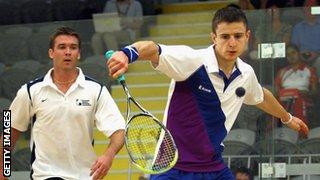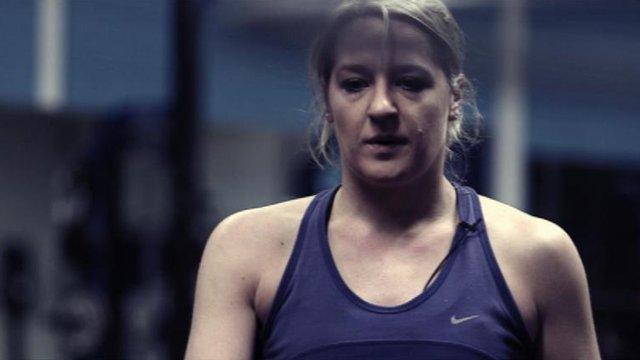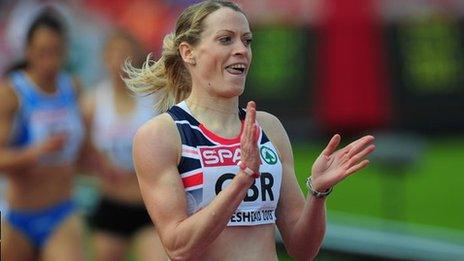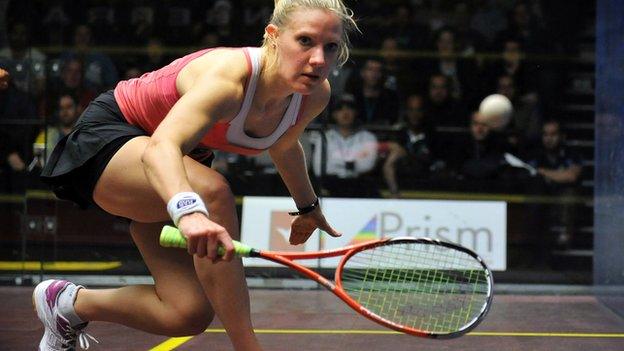Squash: Frania Gillen-Buchert set for third Commonwealth Games
- Published
Feature: Frania Gillen-Buchert
Do we become more or less selfish as we get older?
Frania Gillen-Buchert reckons she is too focused on her Commonwealth squash goals to coach others just yet, but she would dearly love to "give something back" to the sport once she retires ... again.
She frets that that might sound too "cheesy", but her reasoning seems sound.
"I think I have enough experience to help some up-and-coming players in Scotland but I do find it very difficult to coach and play at the same time," says the 32-year-old.
"The selfish part of me is just focused on myself."
The Commonwealth Games in Glasgow this summer will be Gillen-Buchert's third, after Melbourne in 2006 and Delhi four years ago, where she reached the quarter-finals.
Her place in Team Scotland is guaranteed after she was named in the first group of 27 athletes to be selected in September.
If she wins a medal, the selectors and her friends will surely forgive any self-centredness, but it is unlikely they would even recognise it as such.
She is enjoying playing squash now more than ever. She puts that down to giving up on the singles in favour of the women's and mixed doubles.
That hardly sounds selfish. Nor does her ambassadorial role in the Champions in Schools programme, in which she encourages children to work hard and to strive to win.
She is also on the athletes' advisory committee to Glasgow 2014 organisers and holds down a full-time job as communications and events officer at Judo Scotland in Ratho. Her time, therefore, is precious.
"I always said after Delhi I would retire. I tried to but I kept training and produced some of my best results ever," says Gillen-Buchert, who was born in Cape Town and moved with her Scottish father to Edinburgh when she was 14.
In 2012, she became Scottish champion and when she beat Egyptian Nour El Sherbini, then ranked eighth in the world, she felt satisfied that her singles career was over.
The sports and marketing graduate continues: "I've now hung the racket up in the singles and it was great but I still feel that competitiveness with the doubles, because it's so exciting.
"Because you're in a team, there isn't that pressure that it's 100% down to you.
"If you've got a good team anything is possible. It's a shared pressure; you kind of feel like you are going into battle with an army."
At the Commonwealth Games she will partner Philadelphia-based pro Alex Clark in the women's doubles and globe-trotting Alan Clyne in the mixed event at the Scotstoun venue, which is this week staging the British Doubles Open.
She believes her experience of two previous Games will stand her in good stead.
"Looking back on Melbourne my memory is just fear," she says.
"I remember being almost over-excited and a bit in awe of the whole experience. There were 3,000 Aussies cheering on the home team.
"I was like a deer in the headlights. I was awestruck. The noise was fantastic."
For the build-up to Delhi, she was commuting for an hour to be on court for seven in the morning, then doing a full day's work before driving home.
Her situation was not helped by the absence of a doubles court anywhere on the Scottish mainland. She would drive to Manchester to play, rather than journey to Shetland.

Frania Gillen-Buchert teamed up with Alan Clyne in the mixed doubles in Delhi in 2010.
Thinking of the Glasgow Games gives her butterflies in her stomach but she feels that competing only in the doubles means she will not be so stressed.
But she adds: "Because it's a home crowd the feeling of wanting to do well is probably stronger than ever."
Gillen-Buchert now has doubles courts at Glasgow's Scotstoun to practise on. However, with the Atlantic separating her and Clark, she has to work things differently.
She says: "We've used the sports psychologist at the Institute [Scottish Institute of Sport] to set ground rules and a lot of it can be done by email and Facebook.
"We make sure that as a team we function well. Doubles is a great leveller. You have to work together.
"We focus a lot on the tactics, who is doing what and when. We meet up and we slip back into that routine quite quickly."
For all she enjoys the women's doubles, the tactics of the mixed doubles make that her favourite.
She explains: "In the women's, it's more of an equal battle.
"In the mixed you find the weakest link and you pick at it until it breaks, so with Alan I am definitely the weakest link, especially physically!
"In the mixed it's the women who get attacked and it's the job of the male partner to protect and to guide and to get involved."
She partnered Clyne in Delhi, reaching the last eight. They know one another's strengths and weaknesses.
"Alan and I have had some good results against players in the top 10 in the world," she continues. "We work well together as a team. Glasgow should be interesting."
With 18 years' international experience, Gillen-Buchert feels she now benefits from "an emotional maturity on the court". She has worked with sports psychologists on responding to adverse moments.
She says: "If someone hits you with the racket, how do you pull yourself back within 30 seconds to win the next rally?"
Gillen-Buchert says she is the fittest she has been in her career, as is common with many 30-something female players.
A podium finish in Glasgow would be just reward for her punishing schedule.
See a day in the life of Frania Gillen-Buchert in Sport XIV, BBC Two Scotland at 19:00 GMT on Friday 31 January.
- Published16 February 2014

- Published25 September 2013

- Published28 March 2018
